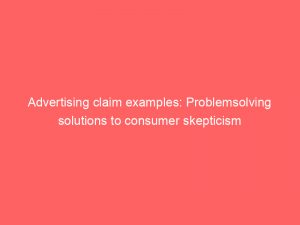- advertising claim examples
- Gerber’s Unsubstantiated Allergy Prevention Claims
- Sensa’s Deceptive Weight-Loss Claims
- Misleading Claims About 5-Hour Energy Drink Shots
- Lumosity’s False Brain Function Improvement Claims
- FAQ
- What is an example of an advertisement claim?
- What is an advertising claim?
- What is an example of a product claim?
- What claims do advertisers make?
In a world flooded with endless advertisingclaims, it’s not always easy to separate fact from fiction.
Companies, big and small, have made bold promises about their products, enticing consumers with the allure of a better life.
But behind these captivating claims lies a murky truth.
Throughout history, household names like Coca-Cola, L’oreal, and Sony have found themselves caught in the crosshairs of lawsuits, accused of deceiving customers with false or misleading statements.
Join us as we delve into the scandalous world of advertisingclaim examples, exposing the tactics employed by these industry giants to captivate our attention and wallets.
| Item | Details |
|---|---|
| Topic | Advertising claim examples: Problemsolving solutions to consumer skepticism |
| Category | Ads |
| Key takeaway | In a world flooded with endless advertising claims, it's not always easy to separate fact from fiction. |
| Last updated | December 29, 2025 |
advertising-claim-examples">claimadvertising claim examples
Advertising claim examples include Gerber claiming that its Good Start Gentle formula prevented children from developing allergies, Sensa claiming that its weight-loss product enhanced the taste and smell of food to make users eat less, and 5-Hour Energy claiming that its energy drink shots were more effective than coffee.
Other examples include Coca-Cola falsely claiming that its Vitaminwater products had health benefits, Nissan airing an ad that made false claims about its truck’s capabilities, and L’Oreal claiming that its skincare cosmetics could alter genetics.
Optimized content based on recent advertiser behavior.
These are just a few instances where advertising claims have been found to be misleading or unsubstantiated.Key Points:
- Gerber claims its Good Start Gentle formula prevents allergies in children
- Sensa claims its weight-loss product enhances taste and smell of food to make users eat less
- 5-Hour Energy claims its energy drink shots are more effective than coffee
- Coca-Cola falsely claims its Vitaminwater has health benefits
- Nissan aired an ad with false claims about its truck’s capabilities
- L’Oreal claims its skincare cosmetics can alter genetics.
Check this out:
💡 Did You Know?
1. In the early 20th century, an advertising claim for Listerine mouthwash stated that it could also be used as a floor cleaner and an ingredient for salad dressings.
2. Volkswagen’s iconic advertising claim “Fahrvergnügen” is a German word that roughly translates to “driving enjoyment” or “driving pleasure.”
3. One of the most controversial advertising claims was made by Camel cigarettes in the 1950s, stating that their cigarettes were “physician-recommended” and “more doctors smoke Camels than any other brand.”
4. In the 1980s, Sunkist claimed that drinking their orange soda would turn your tongue a bright orange color. However, it was later revealed that the actual cause of the temporary discoloration was the food coloring used in the drink.
5. One of the most famous advertising claims that misled consumers was in the 1970s when cereal brand Cap’n Crunch promoted “crunchberries.” However, there are no actual berries in the cereal; the “crunchberries” are just colorful cereal pieces shaped like berries.
Gerber’s Unsubstantiated Allergy Prevention Claims
In 2014, Gerber, a popular baby food brand, faced a lawsuit filed by the Federal Trade Commission (FTC) over unsubstantiated claims about its Good Start Gentle formula. The company had been promoting the formula as a product that could prevent children from developing allergies. However, the FTC found these claims to be unsupported and misleading to consumers.
The lawsuit brought attention to the importance of substantiating advertising claims with scientific evidence. Companies are required to have a reasonable basis for claims made in their advertisements, especially when it comes to health-related claims. Gerber’s failure to provide adequate evidence to support its allergy prevention claims led to the FTC stepping in to protect consumers from potentially misleading and false advertising.
To settle the lawsuit, Gerber agreed in 2019 not to make similar claims without proper scientific evidence. This case serves as a reminder to companies that they must be cautious in making bold claims about the benefits of their products, especially when it comes to health-related claims. It also emphasizes the role of regulatory bodies like the FTC in protecting consumers from false or misleading advertising.
- Companies must substantiate their claims with scientific evidence.
- Gerber’s allergy prevention claims were found to be unsupported and misleading.
- The FTC intervened to protect consumers from false advertising.
- Settlement agreement in 2019 prohibits Gerber from making similar claims without proper evidence.
- This case highlights the importance of regulatory bodies in protecting consumers.
Sensa’s Deceptive Weight-Loss Claims
Sensa, a company selling weight-loss products, found itself in hot water due to its deceptive advertising claims. The company claimed that its product, a weight-loss powder that users sprinkled on their food, enhanced the smell and taste of food, making them feel fuller and eat less. It also made unfounded weight-loss claims, suggesting that the product could lead to significant weight loss.
The Federal Trade Commission intervened and ruled that Sensa’s claims were misleading to consumers. The company was forced to pay a settlement of $26.5 million, highlighting the seriousness of deceptive advertising practices.
“This case serves as a reminder that companies should always support their weight-loss claims with scientific evidence and not mislead consumers with false promises.”
The FTC’s actions against Sensa demonstrate the commitment of regulatory agencies to ensure that consumers do not fall victim to unscrupulous marketing tactics. It also highlights the importance of companies being responsible and transparent in their advertising claims, especially when it comes to products related to health and weight loss.
- Regulatory agencies play a crucial role in protecting consumers from deceptive advertising.
- Companies should provide scientific evidence to support weight-loss claims.
- Transparent and responsible advertising is essential, especially in the health and weight-loss industry.
Misleading Claims About 5-Hour Energy Drink Shots
The energy drink market is highly competitive, with companies often making exaggerated claims to attract consumers. In the case of 5-Hour Energy, the company claimed that its energy drink shots were more effective than coffee and that doctors recommended it. These claims were found to be deceptive and unsupported by evidence.
The Federal Trade Commission (FTC), in its efforts to protect consumers, challenged the accuracy of 5-Hour Energy’s claims. The company was ordered to pay $4.3 million in penalties and fees for its deceptive advertising practices. This outcome sends a strong message to companies that they cannot make false claims or mislead consumers about the effectiveness of their products.
Consumers depend on accurate and reliable information when making purchasing decisions, especially regarding health-related products. The FTC’s actions against 5-Hour Energy highlight the importance of companies providing factual and verifiable information to consumers. It also reinforces the need for regulatory bodies to step in when companies engage in deceptive advertising practices.
- Exaggerated claims in the energy drink market
- 5-Hour Energy’s deceptive advertising practices
- FTC’s $4.3 million penalties and fees
- Importance of accurate information for consumers
- Need for regulatory bodies to address deceptive advertising practices
Lumosity’s False Brain Function Improvement Claims
Lumosity, a company offering brain training exercises through its app, faced legal repercussions for its deceptive advertising claims. The company had marketed its app as a tool that could improve brain function, prevent Alzheimer’s disease, and even enhance school performance. However, Lumosity had no scientific proof to support these claims.
The Federal Trade Commission stepped in and fined Lumosity $2 million for its misleading advertising practices. This case serves as a reminder that companies must have substantiated evidence to support the claims they make about their products or services. Misleading claims about health benefits not only deceive consumers but can also lead to potential harm when individuals rely on unproven claims for medical conditions.
The Lumosity case emphasizes the need for companies to be transparent and honest in their advertising claims, particularly when it comes to health-related products or services. It also underscores the role of regulatory bodies in holding companies accountable and protecting consumers from false or exaggerated marketing claims.
FAQ
What is an example of an advertisement claim?
An example of an advertisement claim could be a toothpaste claiming to be “the dentist’s recommended choice” or “clinically proven to whiten teeth in just one week.” By making such statements, the toothpaste brand aims to position itself as the best option in terms of dental care, leveraging the authority and expertise of dental professionals or scientific evidence to convince consumers of its superiority.
What is an advertising claim?
An advertising claim is a compelling declaration presented in advertisements that highlights the advantages, features, or effectiveness of a particular product or service with the intention of influencing potential customers to make a purchase. These claims are carefully crafted to engage consumers and convince them of the value and desirability of the advertised item. By tapping into the customer’s needs, desires, and aspirations, advertising claims aim to sway purchasing decisions in favor of the promoted product or service.
What is an example of a product claim?
An example of a product claim is “Vitamin C boosts immune system.” Product claims are statements that highlight the benefits or attributes of a particular product, aiming to persuade consumers to purchase or use it. These claims often focus on the positive effects that specific ingredients or components of the product can have on the consumer’s health or well-being. For instance, by emphasizing the immune-boosting properties of Vitamin C, the claim aims to promote the product as a health-enhancing option.
What claims do advertisers make?
Advertisers often make a variety of claims to promote their products or services. Expressed claims, which are explicitly stated through copy, are a common form of advertising. These claims offer specific promises or guarantees, such as “Get visibly smoother looking hair.” By directly communicating the benefits or results of using their products, advertisers aim to attract customers seeking these particular outcomes.
In addition to expressed claims, advertisers also utilize implied claims in their marketing strategies. These claims are not explicitly stated but rather implied through the advertisement’s message or visuals. For instance, showing a person with flawlessly smooth hair in an advertisement for a hair product implies that using the product will lead to similar results. This subtle technique appeals to consumers’ desires and suggests the potential benefits of the product without making explicit promises.
Another approach often used by advertisers is called puffery, which involves making exaggerated or subjective claims about a product. Unlike expressed or implied claims, puffery is not meant to be taken literally. Instead, it is a form of promotional language that relies on exaggerated statements or grandiose claims to capture consumers’ attention. For example, an advertiser may declare their product as “the best in the market,” even though this statement is not objectively measurable. Puffery aims to generate enthusiasm, excitement, and brand recognition rather than providing specific information about a product’s features or benefits.
Programmatic Advertising • Performance Marketing Tips • Native Ad Network • Self-Serve DSP Platform











